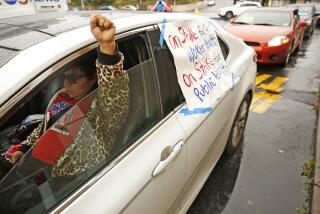1,000-Hour Employees Must Receive Pension Credit
- Share via
Question: I understand there is a law requiring employers to reclassify part-time employees who work more then 1,000 hours a year. Is this correct? Will part-time workers be made full time or just be given similar benefits?
--J.C., Rancho Santa Margarita
Answer: You are referring to a requirement in the federal Employee Retirement Income Security Act that says an employer must normally credit any employee who works at least 1,000 hours with a year toward eligibility for pension benefits. The law does not require any changes in an employee’s status.
--Calvin House, attorney, Fulbright & Jaworski L.L.P., adjunct professor, Western State University College of Law
*
Question: When sick time is accrued during the year, is it legal for the company to take back unused time at the end of the year?
--D.Y., Costa Mesa
Answer: Sick time and sick time pay is a matter of contract between an employer and employee. Accordingly, there are many possible provisions that are perfectly permissible.
If an employer has a traditional sick leave pay policy in which sick pay is contingent on sickness only, many plans stipulate that the unused sick leave balance at year’s end is lost and a worker begins a new accrual rate for the following year.
There are indeed certain situations, however, when an employer has a plan that grants a certain number of “paid days off,” which can be used for any purpose, including sick leave and/or vacation and cannot be “lost” at the end of the year.
Indeed, there are also both state and federal regulations regarding docking the salary of an “exempt” employee.
If you are an hourly employee and fall within a traditional sick leave policy, the practice of the company to take back unused time at the end of the year is permitted.
--Elizabeth Winfree-Lydon, senior staff consultant, The Employers Group
More to Read
Sign up for Essential California
The most important California stories and recommendations in your inbox every morning.
You may occasionally receive promotional content from the Los Angeles Times.









